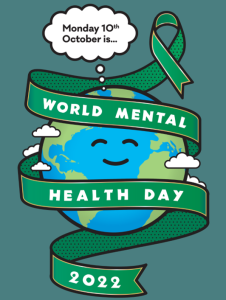 The theme of 2022’s World Mental Health Day, set by the World Federation for Mental Health, is ‘Make mental health and wellbeing for all a global priority‘. In an often unequal and changeable world, it is important that each of us are able to look after our own mental health, while passing on ideas and techniques to those around us.
The theme of 2022’s World Mental Health Day, set by the World Federation for Mental Health, is ‘Make mental health and wellbeing for all a global priority‘. In an often unequal and changeable world, it is important that each of us are able to look after our own mental health, while passing on ideas and techniques to those around us.
Self-care is an important part of how we manage our mental health. As each of us face challenges, we develop strategies to help handle stress and protect our wellbeing.
Below are some tips, from the NHS and mental health charities, which can be helpful self-care reminders to ourselves and those around us:
Stay aware of your mental health
If you know what helps your mental health, let others know too. Tell your friends and family how they can support you and encourage them to let you know how you can best support them.
Keep a mood diary
Tracking your mood can help you find out what makes you feel better or worse. This can help empower you to make good decisions for yourself and avoid situations which negatively impact your mental health.
Stay connected
Seeing friends and family can have a great positive impact on your mental health. If this isn’t possible, a phone call or even a text can make you feel connected and less isolated.
If this isn’t possible, events in your community, or university events can help you meet new people, who may be feeling the same way you are. We have a list of university resources and events below.
Sleep
Getting enough rest will help you feel refreshed and help your mind deal with any stresses you encounter during the day. It’s vital that you give yourself some down time.
Get regular exercise
Even a short walk each day can clear your head and help you feel better. If you’re physically disabled, Disability Rights UK provides information about exercises you might be able to do. Alternatively, ask your doctor for advice.
Try to be mindful
Mindfulness – stopping to take notice of what’s going on around and inside you – can be a great way of keeping in touch with yourself. Being aware of how you are feeling at any moment can help you process feelings productively, rather than being caught up in a moment.
Improve your self esteem
Recognise what you’re good at! Are you a good singer? Cook? Friend? If you can engage in the things you are good at, you’re likely to feel better. Encourage those around you to do the same. We all need reminding of what we do well from time to time.
Wellbeing support at the University
The last couple of years has been challenging for everyone. Frightening world events dominate the news, and cost of living may have you feeling stressed and worried.
Or you may be struggling to settle in or get started. While perfectly normal, this can leave you feeling isolated.
The University has many resources available to help, which can be found here: https://www.bristol.ac.uk/students/support/wellbeing/
Self help ideas can be found here: https://www.bristol.ac.uk/students/support/wellbeing/self-help/
PROJECT:TALK are running a range of support activities, from 1 to 1 phone calls, to targeted group talks: https://www.projecttalk.org.uk/bristol-peer-support
Student Minds offer a range of resources: https://www.studentminds.org.uk/
Emergency support is available here: https://www.bristol.ac.uk/students/support/wellbeing/emergency-help/
Researchers and autistic students at our Elizabeth Blackwell Institute have produced an online infographic, highlighting some of the challenges faced by autistic students and a suite of resources available for students, families and staff: https://bristol.ac.uk/blackwell/media/autism-infographic/


 Mental health includes our emotions and our psychological and social wellbeing. It can affect how we think, feel, behave, and determines how we handle stress, make decisions or approach relationships. We all have mental health and we can all experience challenges with our mental health at different times in our lives.
Mental health includes our emotions and our psychological and social wellbeing. It can affect how we think, feel, behave, and determines how we handle stress, make decisions or approach relationships. We all have mental health and we can all experience challenges with our mental health at different times in our lives.